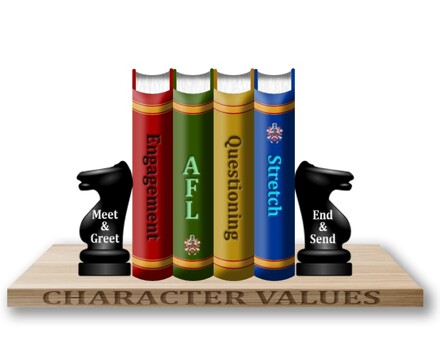- Home
- Personal Development
- Character Values
Character Values
“These values form the core foundation of the school’s moral purpose and strategic direction.”
ACE kitemark assessment, 2025
“It is a community characterised by calm confidence, intellectual curiosity, and an unwavering belief that every young person
deserves to thrive.”Inclusion Quality Mark, Centre of Excellence, 2025
"The strength of the personal development curriculum has been pivotal in establishing a culture of learning in school."
OFSTED, 2022
What is Character Education?
Character is more than just a subject and has a core focus of developing positive personal strengths. It has a place in all walks of life including at home, in the wider school community and lessons to name a few. At Robert May’s, we are continually developing staff and student character in order to teach our young people the importance of being ethically and morally correct, enabling growth in these areas so they can become more reflective and model how to be an upstander in our community, both inside and outside of school.
Through lessons, discussions, and activities, students learn how to apply these values in real-life situations, both in and outside the classroom. Character education helps students develop a strong moral compass, teaching them how to make positive choices and treat others with kindness and respect. By partnering with parents, schools aim to create a supportive environment that nurtures personal growth and helps students become good citizens and empathetic individuals.
"The commitment of teachers and staff at all levels together with their clear understanding of the importance of their individual contributions to the school’s values driven culture is a key strength of this school."
ACE kitemark assessment, 2025
Why is Character Education important?
Character education is a crucial component of a well-rounded education, as it helps students develop the essential skills and values they will need to navigate the complexities of life. At its core, character education focuses on instilling core ethical principles like honesty, resilience , patience, and compassion within young minds. By explicitly teaching and modeling these virtues, we can empower students to make thoughtful, principled decisions both in the classroom and beyond.
Beyond just academic knowledge, character education prepares students to be productive, engaged citizens. Activities and lessons centered on character development encourage students to consider the needs and perspectives of others, resolve conflicts through peaceful dialogue, and take accountability for their actions. This cultivation of social-emotional intelligence equips students with the interpersonal competencies required to collaborate effectively, show compassion, and become positive forces within their communities.
Additionally, research has shown that character education has a profound impact on student well-being and academic achievement. When schools prioritise character alongside traditional subjects, students demonstrate enhanced self-regulation, improved decision-making, and a greater sense of purpose.
This, in turn, leads to higher levels of engagement, reduced disciplinary issues, and improved learning outcomes across the board. In short, character education stands as a vital means of empowering the next generation to become ethical, civic-minded leaders.
As teachers, it is crucial to role model good character values because students often learn by observing the behaviours of those around them, especially authority figures. When teachers consistently demonstrate traits like respect, honesty, kindness, and responsibility, they set a powerful example for students to follow. Modeling positive character helps create a classroom environment rooted in trust, fairness, and mutual respect, which fosters a safe and supportive space for learning. It also reinforces the lessons of character education, showing students that these values aren't just abstract concepts, but principles to live by in everyday life. By embodying good character, teachers inspire students to adopt these values and carry them into their own interactions and future decision-making.
Our development of our core values has developed over the last few years. Student leaders across the age ranges supported me with research from the Jubilee Centre for Character and Values and used the ‘The Building Blocks of Character’ as our starting point.
Using this research and linking our initial Respect, Motivate and Support theme, we took a whole school approach through student voice to develop the key character values that we, as a school, desired most in our community. The result is below:
"Younger students expressed enthusiasm for the character rewards opportunities readily available and it is clear that students understand the
importance of developing their own character alongside realising high academic attainment."ACE kitemark assessment, 2025
Character Education at Robert May’s

Our moral virtues are clearly demonstrated in our Respect and Support sections, enabling students to have opportunities to develop growth in all school situations.
Our performance virtues come from our Motivate section, which provides the student with the tools to be able to confidently improve their values.
Our civic virtues are developed through different parts of the school. All students are part of our House system and a key part of this, among other things, is developing links and supporting 5 local charities. This enables students the opportunities to contribute to the common good and think about those that are less fortunate. In 2024, student based activities led by House captains raised over £6200 which was astonishing. In 2025, £3,450 was raised in one event with our House Fete. Such growth in a short period of time reflects the development of our character values within the school and local community.
We also run a whole school volunteering rota and provide further opportunities for students to develop their civic virtue through the Duke of Edinburgh scheme.
Finally, the intellectual virtues are the key umbrella to student learning in all subjects at Robert May’s School. This links to both examinable and non examinable subjects where students pursue knowledge, truth and understanding. A key part of reflection comes from the personal reflection booklets that students will develop over the course of the year and use to help focus on areas needed for further growth.
We teach the importance of our character through all areas of our curriculum. The development of character is too large to sit just within assemblies where students are supported to be kind to one another. It is driven in all lessons, in and outside of the classroom. Character values are the base to our RMS 6 which teachers use to deliver high quality lessons.

We have fortnightly themes in assembly and tutor time as well as dedicated lessons in PDL lessons and during RMP sessions with tutors using current affairs to support character growth. We also embed teaching within our careers program.
Good character is closely linked to career success because traits like integrity, responsibility, and perseverance are highly valued in the workplace. Employers look for individuals who demonstrate reliability, trustworthiness, and a strong work ethic, as these qualities contribute to a positive and productive work environment. Employees with good character are often better at building strong relationships with colleagues, clients, and supervisors, which can lead to increased collaboration and career advancement.
Traits like adaptability, resilience, and empathy also help individuals navigate challenges and conflicts effectively, making them more capable in leadership roles. In essence, good character forms the foundation for long-term professional growth, as it enhances both personal effectiveness and the ability to contribute positively to any organization.
Our rewards process is designed solely around our character values, enabling students to see links between character and everyday scenarios. Points are also linked to the House Cup enabling students to feel pride for themselves as well as supporting others.
Finally, we have an extensive extra curricular program that changes regularly, with students suggesting clubs that they are interested in, as well as plenty of enrichment and trip opportunities for students to access. These vary from day trips developing culture capital to residential trips, as well as themed day events at school incl;uding our Tri-Service days and smaller activities after school. We really promote getting involved in these activities to develop their own identity and build confidence and resilience as well as teamwork and every after school activity a student undertakes rewards them with points, helping promote the importance of growth outside of the classroom.
Our development of character is a key part of our school and we aim to ensure that our young people leave us confident and capable, having achieved the best they can within and beyond the classroom, poised for success and ready to make a difference to the lives of those around them.
"Students had a noticeable pride in their school and its wider community."
ACE kitemark assessment, 2025





